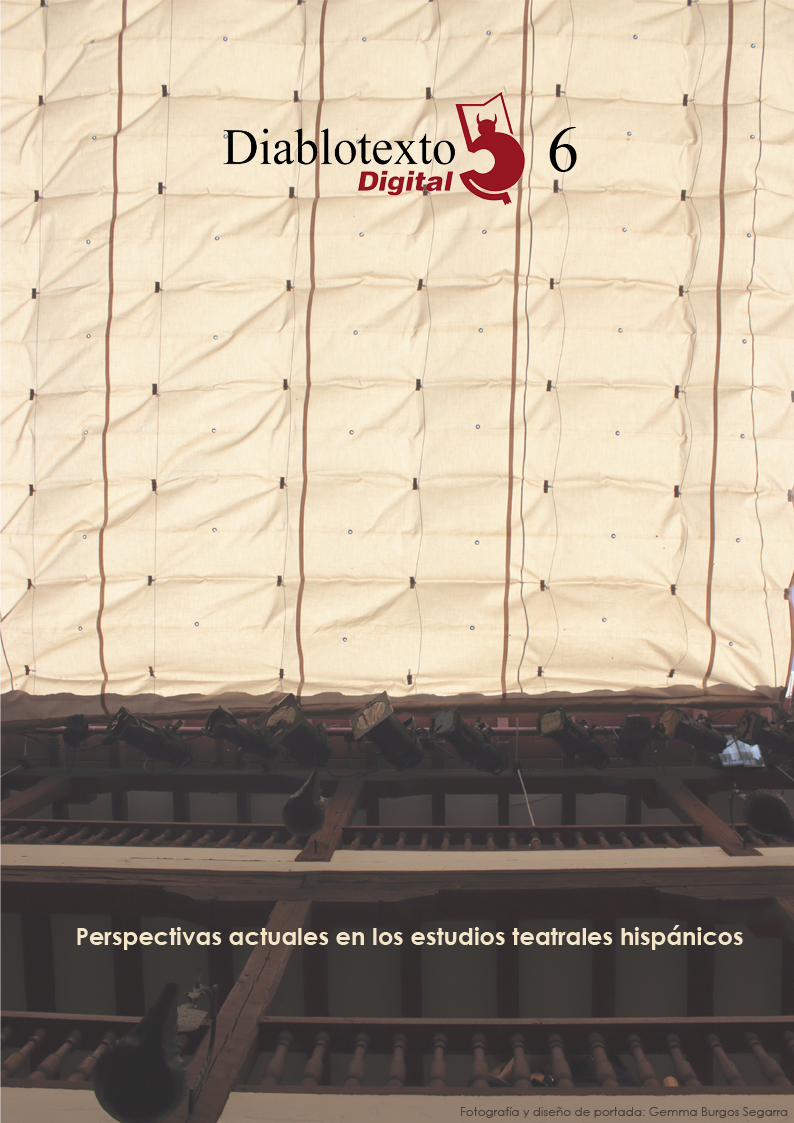Facing Violence: Metatheatre as a Revealing Mechanism in Himmelweg, by Juan Mayorga, and El triángulo azul, by Mariano Llorente & Laila Ripoll
DOI:
https://doi.org/10.7203/diablotexto.6.16767Keywords:
Spanish Theatre, Memory, metatheatre, contemporary dramaturgy Abstract
Abstract
Metatheatre has been used along theatre’s history. Nevertheless, in XXth Century and, subsequently in XXIst
Century, due to his naming, it has started to be used more consciously. Because of this blooming, a great number of escenic works, which has appeared in Spain recently, has been using this resource to present the horror resulting from barbary. Among them, this article tries to make a comparative study between Himmelweg, by Juan Mayorga, and El triángulo azul, by Mariano Llorente & Laila Ripoll, focusing on the theatrical signs related to sound design, space or time.
 Downloads
Downloads
 References
References
Amo Sánchez, Antonia (2020). De Plutón a Orfeo: los campos de concentración en el teatro español contemporáneo (1944-2015). [Inédito].
Aznar Soler, Manuel (2016). “La recepción crítica del estreno de Himmelweg, de Juan Mayorga, en Madrid”, Caracol, 12, 180-205 pp.
Centro Dramático Nacional (2013). “Entrevista con Laila Ripoll”. En Cuaderno Pedagógico nº 32: Autores de hoy II. Madrid: Centro Dramático Nacional, 24-25 pp.
Cabal, Fermín (2009). Dramaturgia española de hoy. Madrid: Autor.
Cornago Bernal, Óscar (2005). “La teatralidad como paradigma de la Modernidad: una perspectiva de análisis comparado de los sistemas estéticos en el siglo XX”, Hispanic Research Journal, 6, 2, 155-170 pp.
Cornago Bernal, Óscar [1999] (2000). La vanguardia teatral en España (1965-1975): del ritual al juego. Madrid: Visor.
Di Pastena, Enrico (2010). “El reloj y la canción: la dimensión metatextual en Himmelweg”, Annali dell’Istituto Orientale di Napoli —sezione Romanza—, 52, 1-2, 29-57 pp.
Gabriele, John P. (2014). Lecturas globales del teatro español del siglo XXI. Madrid: Fundamentos.
Jódar Peinado, María Pilar (2016). Metateatro español en el umbral del siglo XXI: el mundo del teatro y el teatro del mundo. Madrid: Academia de las Artes Escénicas de España.
Johnson, Jerelyn (2016). “La doble función de la canción de cuna de Himmelweg de Juan Mayorga”. En José Romera Castillo, Francisco Gómez Cargajo y Raquel García Pascual (eds.), Teatro y música en los inicios del siglo XXI. Madrid: Verbum, 298-306 pp.
Llorente, Mariano y Ripoll, Laila (2014). El triángulo azul. Madrid: Centro Dramático Nacional.
Mate, Reyes (2009). Medianoche en la historia: comentarios a las tesis de Walter Benjamin «Sobre el concepto de historia». Madrid: Trotta.
Mate, Reyes y Mayorga, Juan (2001). “’Los avisadores del fuego’: Franz Rosenzweig, Walter Benjamin y Franz Kafka”, Isegoria: Revista de filosofía moral y política, 23, 45-68 pp.
Mayorga, Juan (2016). Elipses. Segovia: La uña rota.
Mayorga, Juan (2011). Himmelweg. ed. Manuel Aznar Soler. Ciudad Real: Ñaque.
Oñoro Otero, Cristina (2016). “Cuando no bastan las palabras. La utilización de la música en El triángulo azul, de Laila Ripoll”. En José Romera Castillo, Francisco Gómez Cargajo y Raquel García Pascual (eds.), Teatro y música en los inicios del siglo XXI. Madrid: Verbum, 236-246 pp.
Pavis, Patrice [1996] (1998). Diccionario de teatro. Jaume Melendres (trad.). Barcelona: Paidós.
Reck, Isabelle (2012). “El teatro grotesco de Laila Ripoll, autora”, Signa: revista de la Asociación Española de Semiótica, 21, 55-84 pp.
Sanchis Sinisterra, José (2002). “Una propuesta del autor”. En Terror y miseria en el primer franquismo. Cuadernos Pedagógicos.Madrid: Teatro Común, 9-10 pp.
Trecca, Simone (2016). “Funciones dramatúrgicas de la música en las puestas en escena de Cancionero republicano y El triángulo azul, de Mariano Llorente y Laila Ripoll”. En José Romera Castillo, Francisco Gómez Cargajo y Raquel García Pascual (eds.), Teatro y música en los inicios del siglo XXI. Madrid: Verbum, 247-258 pp.
Downloads
Published
How to Cite
-
Abstract758
-
PDF (Español)708
Issue
Section
License
Licencia de reconocimiento de Creative Commons “Reconocimiento - No Comercia l- Sin Obra Derivada
Authors who publish with this journal agree to the following items:
The authors will keep their copyright and guarantee the journal the right of first publication of their work, which will be simultaneously subject to the Creative Commons license that allows third parties to share the work indicating its author and its first publication in the journal. The authors may adopt other non-exclusive license agreements to distribute the version of the published work (e.g., depositing it in an institutional telematic file or publishing it in a monographic volume), with an acknowledgment of its initial publication in this journal. The authors are allowed and encouraged to disseminate their work through the Internet (e.g., in institutional telematic archives or on their website) before and during the submission process, which can produce interesting exchanges and increase citations of the published work. (See Effect of Open Access)




